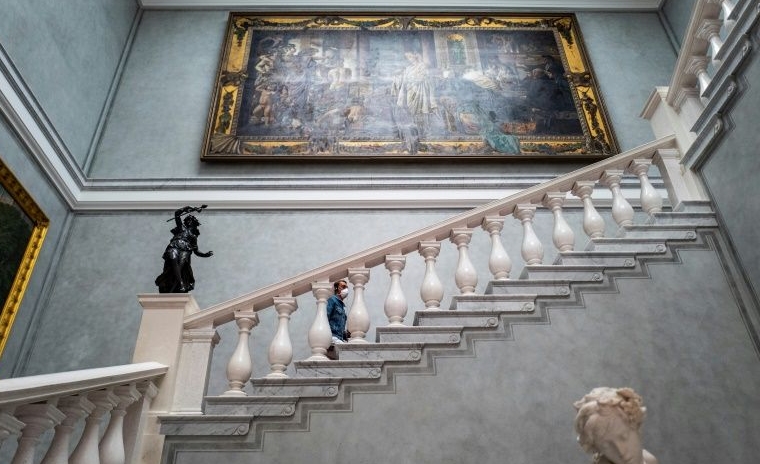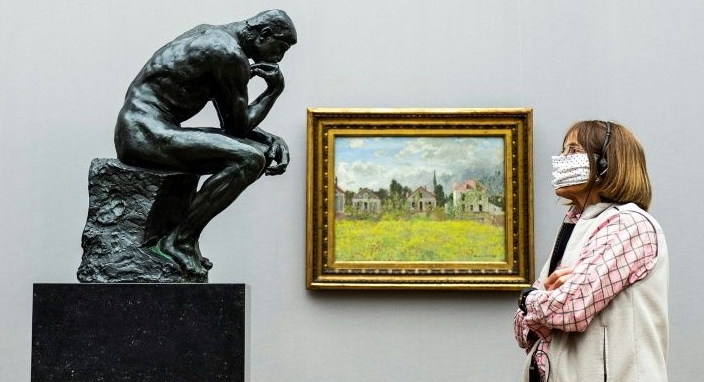By Yannick PASQUET
BERLIN (AFP) — Berlin museums might house the iconic Nefertiti bust, the Ishtar gate of ancient Babylon or Rembrandt masterpieces, but they still trail global counterparts in popularity — and the coronavirus is making things worse.
Millions of euros have been poured into the institutions, yet the 19 museums managed by the Prussian Cultural Heritage Foundation (SPK) attracted just 4.2 million visitors last year, while the Louvre alone drew 9.6 million.
Alarmed by lacklustre public interest, Germany is planning a major shake-up after a report commissioned by Chancellor Angela Merkel's government slammed the foundation as dysfunctional, outdated and out of touch.
For Joerg Haentzschel, a culture journalist at the Sueddeutsche Zeitung newspaper, the capital's museums are plagued by "a persistent culture of exclusivity, lack of transparency and institutional arrogance.
"Those responsible for museums are still serving their own peers first and foremost, rather than bringing everyone in — children, people with dementia, people from other origins and educational backgrounds," he said.

Quiet halls
Around the corner from Potsdamer Platz in the city's bustling business district, the Gemaeldegalerie sits quietly in the shadows of shiny high-rises, its exhibition halls typically dotted with just a handful of visitors.
The museum boasts world-famous masterpieces by Caravaggio, Rembrandt and Vermeer — and yet it attracted only 310,000 visitors last year. And that was before the pandemic hit.
The Gemaeldegalerie is one of 19 museums managed by the SPK, one of the most important cultural institutions in the world with 15 collections and 4.7 million items.
The SPK's most treasured possession, which has pride of place in the Neues Museum, is a limestone bust of Nefertiti, considered by some to be the most famous depiction of a female face in the world after the Mona Lisa.
But comparisons with the Louvre end there. At the Gemaeldegalerie, there are no crowds jostling for a glimpse of the ancient Egyptian queen.
'Institutional arrogance'
And this despite Berlin's reputation as a vibrant cultural hub, attracting artists in droves from all over the world — and a tourism industry that has exploded over the past decade, though now hobbled by COVID-19.
In the damning report, experts called for the SPK to be abolished and replaced by four separate bodies.
With around 2,000 employees and a budget of 335 million euros ($381 million) this year, the SPK is the largest cultural sector employer in Germany.
The experts pointed in particular to failures in the digital arena, accentuated at a time when many of the world's museums are relying on the internet due to international travel restrictions.
"Many international museums have a large number of followers on social media," Marina Muenkler, who chaired the working group behind the report, told the Tagesspiegel newspaper.
"Museums need to be in contact with the public before they come to the museum … Apps can be created for exhibitions. But this is often no longer possible in Berlin, because many museums do not have wi-fi."
The report criticised a reliance on " partly … outdated ideas about museum work" and a failure to reflect the "diversity of the world".
As a result, Berlin's museums "have partly lost or risk losing touch with international developments," it said.
The criticism comes despite millions of euros spent on ambitious cultural projects in the German capital in recent years.
Take the James Simon Gallery, the new entrance building to Berlin's UNESCO World Heritage-listed Museum Island designed by star British architect David Chipperfield — at a cost of 134 million euros.
Or the Neue Nationalgalerie with its Expressionist gems, due to reopen next year after more than five years of renovation work, also led by Chipperfield.
For Culture Minister Monika Gruetters, the report marked a "first, very important step towards making the foundation future-proof", or adapted to future challenges, as she promised to reform the SPK within three to five years.

ADVERTISEMENT
ADVERTISEMENT


































